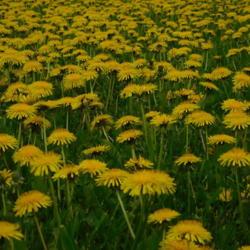
This product also contains boron and silicon, which are important in the bone preservation process, and lecithin, which has been shown to treat a variety of liver problems, as well as choline, another good product for the liver. It packs fiber, potassium, iron, calcium, phosphorus, magnesium, thiamin and riboflavin, and is a good source of protein. It is also rich in copper, cobalt, and zinc.
While other diuretic sources cause a loss of potassium, this product contains so much potassium that despite its diuretic effects, potassium levels rarely decline. One cup of this product contains over 7,000 units of vitamin A (compared to 1,275 units in the same amount of cooked carrots), and is an excellent source of vitamins B, D & E.
And what if this product was 100% natural and potentially free. Would you try it? Sounds too good to be true? Not in this case - there really is such a product out there. Yet each year, hundreds of thousands of dollars are spent on an estimated 80 million pounds of herbicides to eradicate this product from suburban America.
You know this product. You see it and recognize it every single day.
That's right, the steadfast and stubborn little "weed" that became the scourge of suburbia in post WWII America, is finally getting its due.
Dandelion is in the same family as Echinacea (purple coneflower), and Chicory. Known by many as a good source of wine, tea or coffee, modern day American medical science is only beginning to discover what many indigenous people have known for hundreds of years: the dandelion is a "miracle drug". Its scientific name, Taraxicum officinale, comes from the Greek Taraxo, meaning "disorder" and akos, meaning remedy. Officinale means it is used medicinally.
Historically this plant has been widely used as both food and medicine throughout Europe and Asia. Its use as medicine was first recorded by Arabian physicians in the tenth and eleventh centuries, and it was also referred to in Welsh medical writings of the thirteenth century. It has long been cultivated in India as a remedy for liver ailments.
The dandelion was originally brought to America from Europe (probably on the Mayflower), to provide food for honeybees, and Native Americans embraced the plant. They not only used it for food, but also to treat stomach and digestive problems, arthritis, blood disorders, as an antiseptic for wounds, and many other ailments, both internally and externally.
Some preliminary studies on diabetic mice suggest that dandelion may also help normalize blood sugar levels. Extracts of this plant have been shown to have moderate antimicrobial and antibacterial effects, as well as anti-inflammatory and antioxidant properties. Test tube studies have shown anti-tumor activity against liver, colon and melanoma cancer cells. Studies have also shown that this product may even help prevent Alzheimers!
All parts of this plant are edible. Just like its chicory relative, dandelion roots can be dried and roasted to make coffee; young leaves are often used in salads (more mature leaves add a slightly bitter taste, which some people find palatable as well); and the flowers can be sautéed like mushrooms.
So why fight it? Let your lawn grow into a beautiful meadow of bright, cheerful, yellow flowers. Consider all of those bees you're benefiting who would probably thank you if they could, for the sweet nectar you're providing for them. Consider your own health and well-being. Embrace the dandelion and take advantage of the health benefits it offers free of charge.
"A weed is a plant whose virtues have not yet been discovered." - - (author unknown).
If you do not have dandelion available to you fresh and pesticide free, fear not. Thanks to the wonders of modern science, you can purchase quality dandelion in the form of vitamins, root tea, or cut and sifted dried leaf .
(A note of caution: dandelions contain latex and should not be used by anyone with a latex allergy, as every part of this plant could cause a reaction. It should also be avoided by those with severe pollen allergies. Results from medical use depend on each individual's body chemistry. Consult your doctor before attempting any medical regime.)
[Editor's Note: This article provides general information and discussions about health and related subjects. The information and other content provided in this article, or in any linked materials, are not intended and should not be construed as medical advice, nor is the information a substitute for professional medical expertise or treatment. If you or any other person has a medical concern, you should consult with your health care provider or seek other professional medical treatment. Never disregard professional medical advice or delay in seeking it because of something that have read in this article or in any linked materials. If you think you may have a medical emergency, call your doctor or emergency services immediately. The opinions and views expressed on this article have no relation to those of any academic, hospital, health practice or other institution.]